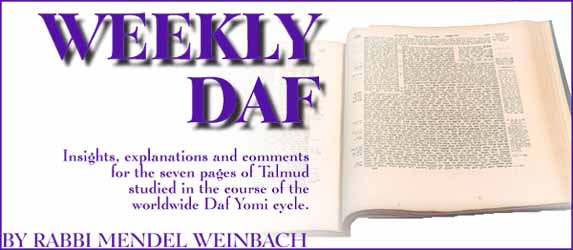Weekly Daf #84
Shavuos 21-27 -- Issue #84
18-24 Elul 5755 / 13-19 September 1995
This publication is also available in the following formats:
The Oath and the "Man"
If a man takes a false oath as a result of a lack of awareness the Torah requires him to bring a sin-offering as an atonement. The Torah's stress on the word man, says the Talmud, is to indicate that this responsibility applies only to when he was entirely a man at the time of the oath, completely aware of the circumstances.The following case is cited as an example of where no sacrifice is required because the one who took the oath did so in circumstances beyond his control.
Rabbi Kahana and Rabbi Assi were both disciples of the Sage Rav. When they left Rav's presence they had a dispute as to what he had taught them. Each one of them took an oath that Rav had taught what he claimed to have heard from him. When they returned to Rav he informed them which one was right. His disappointed colleague turned to Rav and asked: "Does this mean that I was guilty of taking a false oath?"
"No," Rav reassured him, "for your memory deceived you into believing that I had made the statement you reported. You were therefore not considered the man who is responsible for seeking atonement for a false oath taken because of a lack of awareness."
In similar fashion, if one takes an oath that he ate something because that is what his memory told him and it turns out that he did not eat it he will not have to bring a sacrifice. But if he says, "I know I did not eat it and that it is forbidden to take an oath that I ate it but I am not aware of whether there is an obligation to bring a sacrifice for such a violation" - this is a case when he is considered a man who sinned with full knowledge of the circumstances but as a result of a lack of awareness of the gravity of the sin, and such an oath-taker must bring a sin-offering as an atonement.
When Words Count as Action
"You shall not take the Name of Hashem your G-d in vain,"reads the Third commandment,
"for Hashem will not absolve one who takes His Name in vain."
The stress on Hashem not absolving one who takes a false oath leads Rabbi Shimon bar Yochai to deduce that only the Heavenly Court offers no absolution, while the human court does offer him absolution through the atonement of lashes. This leads to the conclusion that taking a false oath is punishable by lashes, an exception to the general rule that lashes are never given when there is no action beyond mere speech.
General Editor: Rabbi Moshe Newman
Production Design: Lev Seltzer
HTML Design: Michael Treblow
HTML Assistant: Simon Shamoun
© 1995 Ohr Somayach International - All rights reserved. This publication may be distributed to another person intact without prior permission. We also encourage you to include this material in other publications, such as synagogue newsletters. However, we ask that you contact us beforehand for permission, and then send us a sample issue.
This publication is available via E-Mail
Ohr Somayach Institutions is an international network of Yeshivot and outreach centers, with branches in North America, Europe, South Africa and South America. The Central Campus in Jerusalem provides a full range of educational services for over 685 full-time students.
The Jewish Learning Exchange (JLE) of Ohr Somayach offers summer and winter programs in Israel that attract hundreds of university students from around the world for 3 to 8 weeks of study and touring.
Ohr Somayach's Web site is hosted by TeamGenesis
Dedication opportunities are available for Weekly Daf. Please contact us for details.







